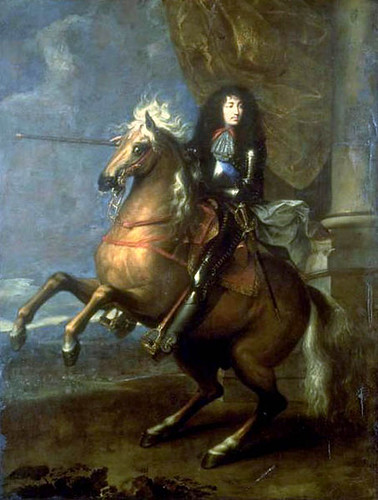France vs. Spain
England
The Dutch Republic
Sweden
Background:
Louis XIV was a young King in 1667 and obsessed with proving his worth as a ruler which according to the times he lived in was done through war. The French King set his eyes on the Spanish Netherlands (Belgium today) and once again it was the missing dowry of his Spanish wife, Marie Thérèse, that sparked the conflict. The Spanish King died in 1665 which meant that as a child of his first marriage, Marie Thérèse had a claim to some of the Spanish territories since the dowry had not been paid. However, these territories went to Carlos II who was a child of the King's second marriage.
England and the Dutch Republic were involved in a war of trade but they halted their hostilities since France would be too powerful if she succeeded in integrating the Spanish Netherlands into France. The two countries were joined by Sweden which made up the Triple Alliance in support of Spain.
| Louis XIV visits the trenches |
Trivia - The French court and the War of Devolution:
- Louis XIV assembled an army of 72.000 men
- He appointed the Prince de Condé, Henri de La Tour d'Auvergne and the Viscount Turenne as commanders of his armies - two of them had fought in the Thirty Years' War
- Louis XIV led the siege of Lille in person
- The entire court travelled with the King to the front causing a massive logistical issue
- Queen Marie Thérèse was forced to travel in the same carriage as her husband's two mistresses, Louise de La Valliére and Athénaïs de Montespan
- The King had arranged for several artists to accompany the court to document his efforts at the front, including Lully, Molière and Charles le Brun
 |
| Louis XIV by Charles le Brun, painted during this period |
Outcome:
Louis XIV soon realised that despite his reason for the war actually was legal the coalition against him was getting too grand (Spain had recently made peace with Portugal). So, he agreed to a secret treaty with the Holy Roman Emperor, Leopold I; this treaty meant that the Emperor would allow France to gain parts of the Spanish Netherlands on the death of the sickly Carlos II. This gave Louis XIV the confidence to settle the war with the - from French point of view - very generous Treaty of Aix-la-Chapelle in which France got to keep several strongholds on the border to the Empire as well as towns within Flanders. However, she had to give up Franche-Comté.

No comments:
Post a Comment